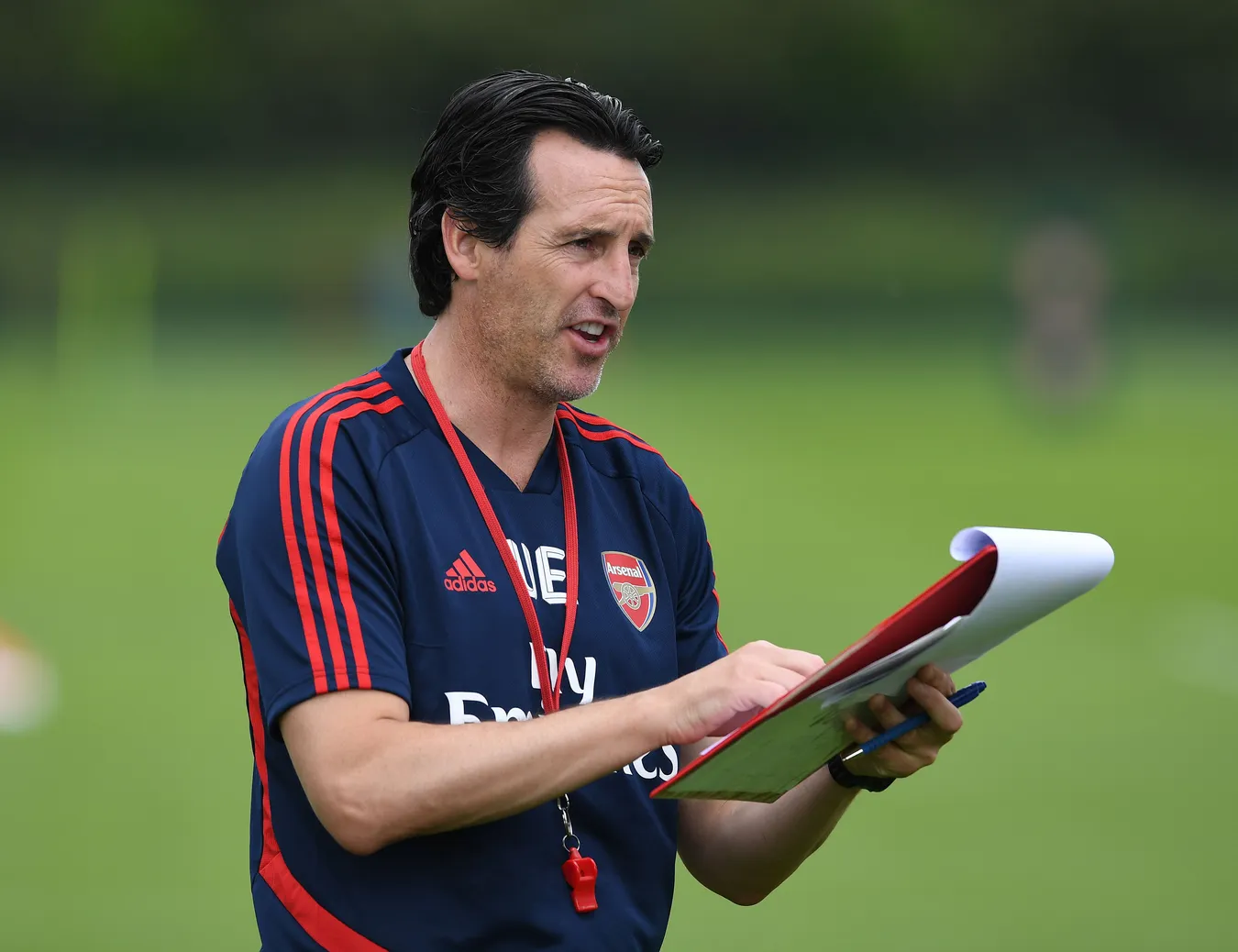
Unai Emery Etxegoien
Date of birth: 3 November 1971
Place of birth: Hondarribia, Spain
Nationality: Spanish 🇪🇸
Arsenal Managerial Career: 2018-2019
General Information
Unai Emery (born November 3, 1971) is a Spanish football manager known for his tactical discipline, deep preparation, and strong track record in European competitions. Emery took charge of Arsenal in 2018, succeeding Arsène Wenger and becoming the club’s first new manager in over two decades. Though his tenure was relatively short, it marked a transitional period defined by both promise and instability as Arsenal sought to redefine itself in the post-Wenger era.
Early Life and Managerial Rise
Born in Hondarribia in the Basque Country, Emery came from a footballing family. After a modest playing career as a left-sided midfielder, he transitioned to management at a young age. He first gained recognition with Lorca Deportiva and Almería, earning promotions with both clubs.
Emery’s reputation grew significantly at Valencia, where he consistently secured top-three La Liga finishes despite financial limitations. He later managed Spartak Moscow briefly before achieving major success at Sevilla, where he won three consecutive UEFA Europa League titles from 2014 to 2016 — establishing himself as a specialist in knockout competitions.
A two-season spell at Paris Saint-Germain followed, during which he won multiple domestic titles but faced pressure over Champions League exits. His ability to manage high-profile squads underlined his credentials at the top level.
Arsenal Tenure (2018–2019)
Unai Emery was appointed Arsenal head coach in May 2018, succeeding Arsène Wenger after 22 years. His arrival marked a new chapter in the club’s history, with hopes that his tactical structure and European pedigree would bring fresh direction and silverware.
Emery inherited a squad in flux and immediately set about implementing his methods — emphasising structured buildup from the back, aggressive pressing, and detailed opponent-specific preparation. He placed trust in emerging talents like Matteo Guendouzi and Lucas Torreira, while integrating experienced figures such as Pierre-Emerick Aubameyang, Alexandre Lacazette, and Mesut Özil.
In his first season (2018–19), Emery guided Arsenal to a 22-game unbeaten run in all competitions, showing early signs of progress. Despite a late collapse in the Premier League that cost them a top-four finish, he led the team to the UEFA Europa League final — defeating Napoli and Valencia en route.
However, the final in Baku ended in a heavy 4–1 defeat to Chelsea, leaving Arsenal without Champions League qualification. The performance exposed underlying inconsistencies, especially in defence, and raised questions about squad cohesion and Emery’s communication style.
His second season began with optimism following the high-profile arrivals of Nicolas Pépé, Kieran Tierney, and Dani Ceballos. However, performances became increasingly disjointed. Language barriers, mixed tactical messages, and a lack of clear identity on the pitch contributed to mounting pressure.
In November 2019, following a winless run of seven matches, Emery was dismissed by the club. His final record stood at 43 wins, 15 draws, and 20 losses in 78 games — a period that included some exciting attacking football but also defensive frailty and inconsistency.
Tactical Philosophy
Emery is known for his meticulous attention to detail, studying opponents rigorously and adjusting his tactics accordingly. At Arsenal, he often used a 4-2-3-1 or 3-4-1-2 formation, aiming to control games through structured buildup and counter-pressing.
While his adaptability is a strength, critics argued that his constant tactical tweaking at Arsenal led to confusion among players and a lack of clear identity. His preference for detailed instruction and reactive setups sometimes clashed with the expressive traditions of the club.
Despite this, Emery was able to craft dangerous attacking transitions and showed strategic nous in European competitions. His ability to tailor game plans to specific opponents was evident in Arsenal’s Europa League run.
Leadership Style
Emery is an intense and diligent figure, known for long hours of video analysis and preparation. While respected for his work ethic and experience, his command of English during his time at Arsenal was limited, which reportedly affected dressing-room communication and clarity.
He valued discipline, effort, and tactical obedience, sometimes at the expense of creativity and player freedom. While some players thrived under his approach, others struggled to adapt.
Legacy at Arsenal
Unai Emery’s time at Arsenal is often viewed as a transitional phase. Tasked with succeeding a club icon, he faced the difficult challenge of reshaping a squad in flux while delivering results. Though he didn’t achieve lasting success, his tenure included flashes of tactical sophistication and a deep Europa League run.
His departure paved the way for Mikel Arteta’s appointment and a broader cultural reset at the club. In hindsight, Emery’s spell highlighted the challenges of replacing a long-serving manager and the importance of clarity and alignment between philosophy and personnel.
Post-Arsenal Career
After leaving Arsenal, Emery returned to Spain and quickly reestablished his credentials at Villarreal, leading them to Europa League glory in 2021 — defeating Manchester United in the final. His reputation as a European specialist was reaffirmed.
In 2022, he took over at Aston Villa in the Premier League, transforming the team into one of the league’s most tactically astute and defensively robust sides. His success in revitalising Villa further reinforced his standing as an elite manager capable of rebuilding and overachieving.
Conclusion
Unai Emery’s Arsenal chapter was brief and complex — a period of adjustment following a historic managerial era. Though his impact at the club was mixed, his work laid groundwork for structural change and reaffirmed his status as a meticulous, driven tactician. Emery remains a respected figure in European football, admired for his resilience, adaptability, and deep tactical acumen.
| P | W | D | L | Win % |
| 78 | 43 | 16 | 19 | 55.13 |

